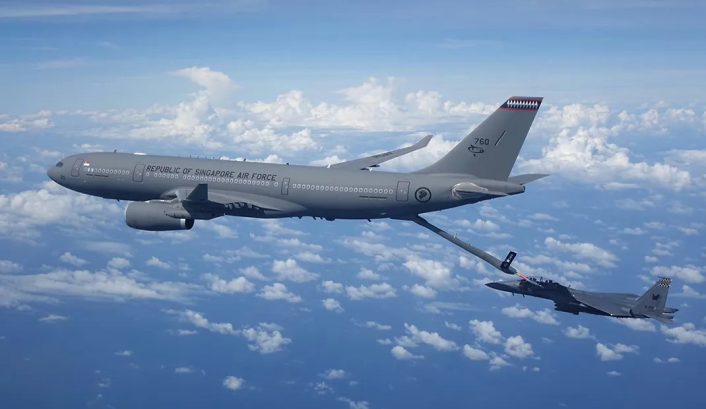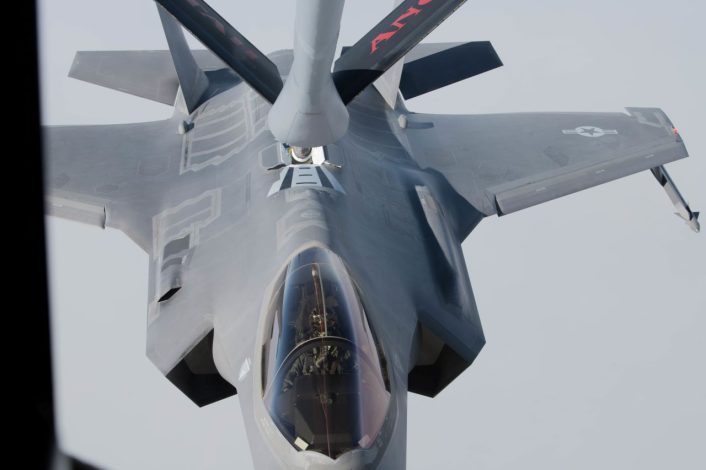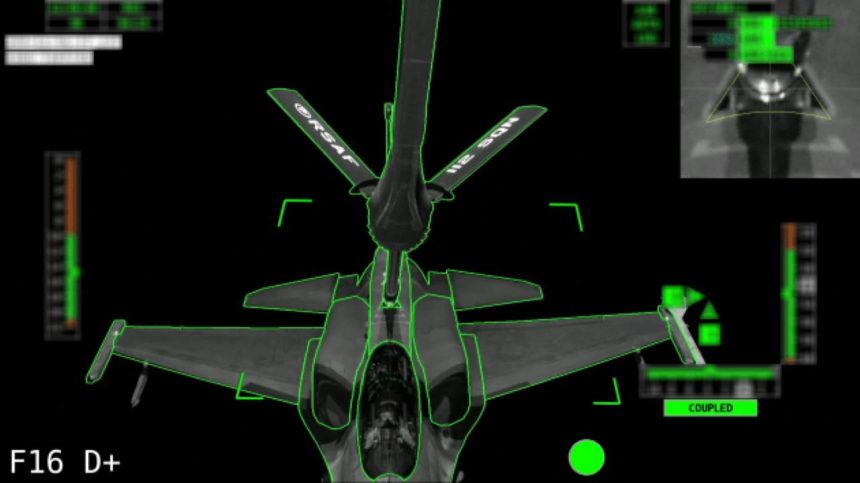With Automatic Air-to-Air Refueling, the Boom Flight Control System becomes fully automated and autonomously makes contact with the receiver, reducing the tanker’s crew workload.
The Airbus A330 MRTT (Multi-Role Tanker Transport) achieved a new milestone, when an RSAF (Republic of Singapore Air Force) aircraft completed an A3R (Automatic Air-to-Air Refueling) in night-time between May and June this year. Airbus mentions this was a key step towards the certification of the system in 2025.
The company said that the RSAF A330 MRTT, equipped with the latest A3R system configuration, conducted ten flights with Portuguese F-16s, Singapore F-16s and F-15SGs fighters and another Singapore MRTT as receivers. The groundwork for the A3R capability had been laid in Feb. 2020, when Airbus and the RASF announced a collaboration to certify the technology.
A series of extensive tests were then conducted in 2022 and 2023 on RSAF aircraft, before the system was put to use in its entirety in the latest refueling. The SMART MRTT programme, as it has been called, will not only develop, certify and implement A3R capability, but also enhanced maintenance solutions for the A330 MRTT.
The Airbus #A330MRTT has achieved a world first aviation milestone by completing an automatic air-to-air refuelling (A3R) flight test campaign in night conditions – a key step towards certification in 2025. Between May and June this year, @TheRSAF A330 MRTT embodying the latest… pic.twitter.com/XhaAZhQnq9
— Airbus Newsroom (@AirbusPRESS) July 23, 2024
Automatic night time refueling
According to Airbus, contacts were carried out in different night illumination conditions and receiver external configurations during these tests. The company did not specify if the contacts were “wet” or “dry”, with the former indicating the transfer of fuel. This activity followed the development of “new A3R night operation algorithms and new camera system standards.”
Video released by the defense major showed the boom of the RSAF A330, assigned to the 112 Squadron, refueling five different aircraft in dark conditions. The boom was shown connecting with the refueling ports of an F-16C, two F-16Ds (including a D+ with conformal fuel tanks), an F-15G and another A330 MRTT. The Portuguese F-16s were not shown in the video.
The footage recorded by the thermal camera shows the optical tracker perfectly outlining the contours of the receiver aircraft. An inset screen shows a close-up of the probe entering the refueling port to ensure precision, with the graphics showing the boom transitioning from the free-flight mode to the coupled mode with the receiver.

Earlier tests
The night tests are a follow-on of the A3R refueling system demonstrations by Airbus and the RSAF in 2022 and 2023. In Jun. 2022, the A330 became the first tanker to conduct A3R in daylight with the RSAF. Then in Aug. 2023, over the course of three weeks, an RSAF A330 MRTT made “more than 500 automated wet and dry contacts with the air force’s full fleet of receiver aircraft.”
The Aug. 2023 tests came ahead of the certification of the new technology that had been slated to take place in the first half of 2024. During the test campaign, further flights were carried out in night conditions with the RSAF’s A330 MRTT, F-15s and F-16s. The RSAF operates 20 F-16Cs and 40 F-16Ds, in addition to 40 F-15SGs.
“The RSAF used the aircraft receivers for data collection to complete the development and enable night capabilities with the automated system,” said Airbus. The company further added that the tests covered the whole operational AAR envelope in different weather conditions, meaning that the entire system was tested in the different stages of the entire refueling process at all speeds, altitudes and attitudes allowed by the certification.
The Airbus A330 MRTT has become the world’s first tanker to be certified for automatic air-to-air refuelling (A3R) boom operations in daylight following a successful campaign in collaboration with the Republic of Singapore Air Force (RSAF). pic.twitter.com/S9OxQstZpD
— Vayu Aerospace Review (@ReviewVayu) July 21, 2022
The need for A3R
According to Airbus, the automatic refueling system reduces ARO (Air-Refueling Operator) workload, improves safety and optimizes the air-to-air refueling transfer rate in operational conditions to maximize air superiority. With A3R, the Boom Flight Control System becomes fully automated and transfers fuel upon contact with the receiver, with the ARO simply monitoring the operation.
In the event of an anomaly due to receiver stability deviations or malfunctions on the tanker, the A3R system is able to disconnect and/or clear the boom away from the receiver safely. On the receiver end, pilots closing in to the tanker take visual cues from the automated PDL (Pilot Director Lights), which aid “smoother transitions and minimize time during the coupled state.”
The air-to-air refueling is one of the most complex and delicate maneuvers, which adds to the already high levels of stress of the crews during long-duration combat missions. Because of this, refueling mishaps are not always caused by technical shortcomings, but can also be caused by human errors.
The Aviationist on Jul. 2 had comprehensively reported an inflight incident between a U.S. Air Force KC-46 Pegasus tanker and an F-16 off the coast of the Netherlands. Airband listeners heard the F-16 pilot report “a chunk taken out of its spine due to a too close breakaway incident.”

“Human error is another significant factor, as pilots and boom operators must perform precise maneuvers, sometimes under stressful conditions like poor visibility or turbulence. Additionally, the physical stresses on the aircraft and the refueling hardware can cause wear and tear, leading to unexpected failures,” The Aviationist’s story said.
In the works since 2020
Airbus and the RSAF had announced their collaboration for the A3R system for the A330 MRTT on Feb. 12, 2020, intended to “develop, certify and implement the A3R capability as well as enhanced maintenance solutions for the A330 MRTT”. The Airbus A330 MRTT is currently certified for aerial refueling with both boom and hose-and-drogue systems, with the receivers including the F-15, F-16, F-35, A330 MRTT, AWACS, F/A-18 and the Eurofighter Typhoon.









